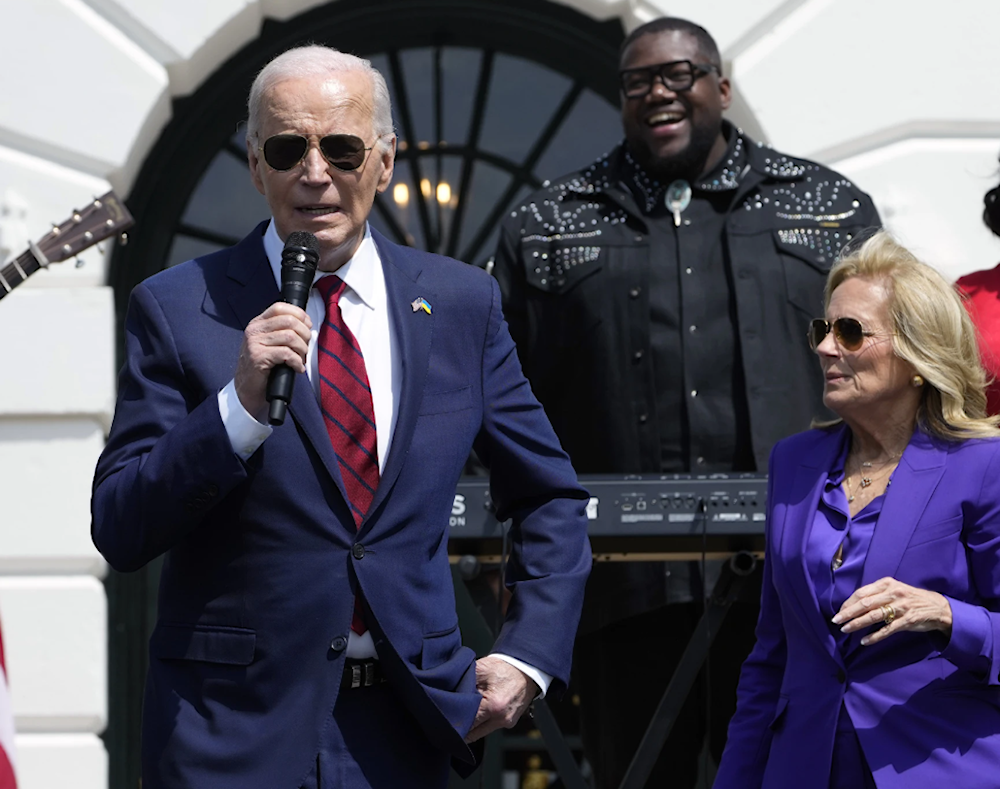Gaza could be Biden's Vietnam, minus US boots on the ground
Like Vietnam, Gaza is dividing Americans, particularly Democrats along the lines of generation, race, and class.
-

Joe Biden and his wife Jill Biden greet riders at the Wounded Warrior Project's Soldier Ride on the South Lawn of the White House on April 24, 2024. (AP)
According to Tim Stanley, pundits and protesters are drawing comparisons between Joe Biden and Lyndon B. Johnson, another liberal president felled by a bloody war. In many respects, Gaza is unlike Vietnam since the US has no troops there, but Stanley tells The Telegraph that the "disturbing" comparison still exists.
Firstly, Stanley notes that Biden "owns the Middle East conflict," even as he supposedly condemns the massive number of civilian casualties. Biden remains a "die-hard Zionist" incapable of severing ties with Benjamin Netanyahu, and although Biden has expressed he does not approve or agree with everything Benjamin Netanyahu may say, he still, like the US government at the time of Vietnam, defends it and considers it crucial to US security at all costs.
This cost was not only financial or reputational; it also alienated America's youth and split liberals.
Like Vietnam, Gaza is dividing Americans, particularly Democrats along the lines of generation, race, and class.
Ross Douthat wrote in The Washington Post that the left uses college campuses to link "Israel" to South Africa's apartheid and call for decolonization, leaving older liberals to fight to restrain forces with which they are typically sympathetic.
Claudine Gay, former Harvard President, lost her position after infamously saying that anti-Semitic sentiments can be regarded in context. Minouche Shafik of Columbia has cleverly gone the other way, telling Congress that anti-Zionist academics would be penalized and summoning the authorities to disperse the protesters.
Stanley recalls that both Columbia and Chicago were epicenters of anti-Vietnam protests in 1968, where cops attacked young activists with truncheons.
Although there have been reassurances that there will be no repeat of 1968, Mayor Brandon Johnson is "black, left-wing, and a scion of the teaching unions" and helped pass a ceasefire motion in the city council recently.
Furthermore, Stanley believes that even if there are no violent fights, the convention will be compelled to address the party's increasing moral crisis, as the new Left confronts the Zionist old guard for power.
Pro-"Israel" lobbies are anticipated to spend millions of dollars this election season, targeting Democrats who want a ceasefire. Anti-war Democrats are accused, as they were in 1968, of not only desiring to stop the battle but actively aiding the opposing side, Hamas and the Vietcong.
Biden felt obligated to condemn anti-Semitism at Columbia, which he countered with a shot at individuals who do not sympathize with Palestinians - even though his administration approved a billion-dollar Israeli assistance package through Congress. The author then questions the core issue of Biden's inability to determine whether or not to support Netanyahu fully.
LBJ sought to combat the Vietnam War with "minimal engagement and casualties," a tactic that may have extended the battle and increased the death count. Biden must also decide whether to let the occupation completely eradicate Palestinian society or to salvage what remains.
Biden's 'reckless gamble' of assuming uni protests will end soon: NYT
If US President Joe Biden is betting on university anti-Israeli genocide in Gaza protests to die out and "lose passion" and that Democrat voters would naturally go back to supporting the party when elections near, then he is engaging in a "reckless gamble", an op-ed piece published in The New York Times on Thursday concluded.
The author, Charles M. Blow, recalled the historic anti-Vietnam War protests that took place during the Democratic National Convention in Chicago in 1968, stating that history is repeating itself today.
Protests at the time saw brutal clashes between demonstrators and police forces. The police response was later criticized by a federal commission, which described it as a "police riot," and the attention was indeed shifted away from the convention.
He added that the generation that witnessed the United States war on Vietnam was prepared for protest, fueled by a deep sense of moral conviction against it.
Pointing out the similarities between today and then in terms of coverage, as the war on Gaza is being broadcast on social media outlets, he mentioned that the war on Vietnam was dubbed the first "television war," and that it was the first conflict where Americans "could witness the horrors of war almost in real-time."
"The movement against it began mostly on college campuses and grew," the writer said.
The author argued that, despite semesters nearing an end for summer break, that was not the case in the 1968 protests. Demonstrations continued for months until the DNC in August. "Organizers planned a major protest, intended to be held regardless of whether it was sanctioned, drawing students from around the country," he said, referring to this event potentially happening again in the anti-genocide protests.

 5 Min Read
5 Min Read








